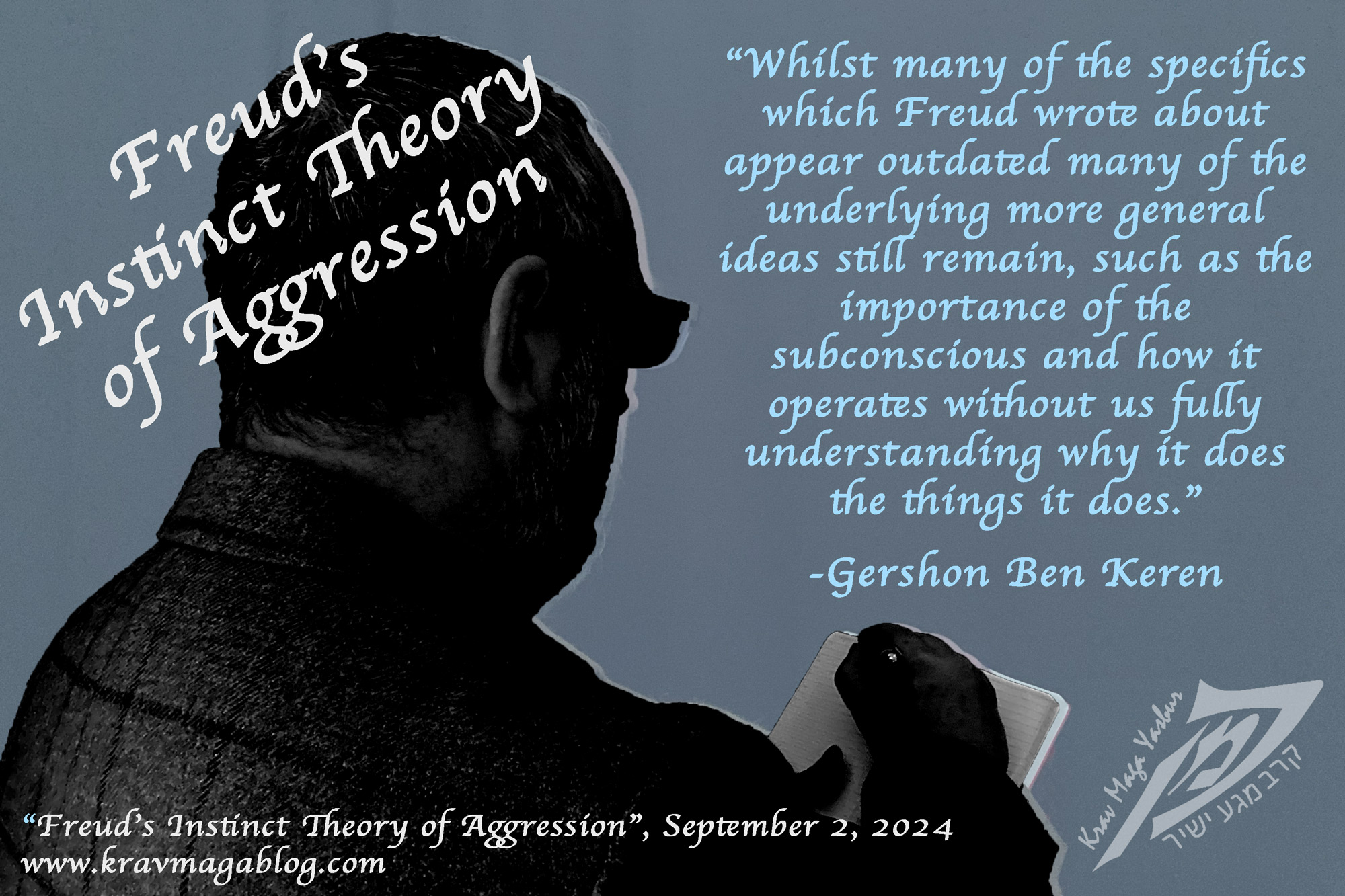Freud’s Instinct Theory of Aggression

In last week’s article I looked at aggression and violence being explained by social learning theory; that aggression and violence is learnt through observation, and that it doesn’t even have to be experienced – but can be learnt by simply witnessing an aggressive/violent incident. In this article I want to look at the Instinct Theory of Aggression that was put forward by Sigmund Freud. As a teenager I tried to “learn” Freud from his books. I remember scouring second-hand bookstores looking for cheap copies of his writings that I could afford – most secondhand book shops at the time would have a shelf with a handwritten felt-tip penned piece of colored card that read “Psychology”, and that would often contain self-help, relationship and weight-loss books, with an occasional copy of something that might academically qualify as being “psychology”. When I was an undergrad Freud’s works were still extremely relevant, and many psychologists and therapists were not yet ready to fully dismiss his psychoanalytic approach as being irrelevant and unscientific etc., probably because there wasn’t anything that was much better to replace it with; and in fact, for some people, although not universal, Freud’s method seems to have worked and been effective. Despite Freud getting a lot of things “wrong”, such as women having “penis envy”, and believing that all boys want to kill their father, and that dreams are extremely significant etc., Freud was a bit of a revolutionary, and I was glad to have the opportunity to study his teachings in a structured and academic setting, rather than trying to make sense of them from my previously self-structured and immature approach that wasn’t able to separate that which was valuable from the that which was misleading and plain wrong.
Freud was extremely important in recognizing that we have a subconscious that isn’t easily accessible to our conscious mind. Until Freud came along, Descartes had ruled the day, with his, “I think, therefore I am” approach, that imagined every recess of the mind was accessible to the conscious mind i.e., we could know everything about ourselves. Freud recognized, even though he couldn’t “scientifically” prove it, that this wasn’t the case and that the conscious mind simply represented the tip of the iceberg; that there was a lot more going on under the water. His lack of a truly scientific methodology probably cost him the 1926 Nobel prize in medicine, as Albert Einstein wrote to the committee, saying that because of this he didn’t deserve the award. Freud believed that many of his clients’ problems and issues, such as anxiety, were caused by unconscious fears and uncertainties that subconsciously affected conscious thought processes, and if these could be reached by the conscious mind they could be addressed. This was the basis of his psychoanalytic method/process; teaching people how to get in touch with and reach their unconscious. If his clients wanted to truly realize their potential – or self-actualize as Maslow later put it – they would need to understand who they fully were i.e., reach into their unconscious, and access all parts of it – something we now know isn’t possible, due to protections that the subconscious employs, such as engaging in self-deception or as Freud termed it, “repression”. Some of the problems concerning Freud come from the way in which his works were translated e.g., Freud wrote/spoke German, so he never used terms such as the “Id”, the “Ego”, and the “Super Ego”. Instead, what we know as the “Id” was actually the “It”, and the “Ego” was the “I”. The Id/It referred to subconscious processes that generally wanted immediate gratification, whilst the Ego/I was what held them in check, with the Super-Ego/Super-I, being the value set that we aspire to e.g., the Id/It will tell us to eat in the moment, with the Ego/I telling us that we shouldn’t just yet because we’re driving and it’s not lunchtime, whilst at the same time the Super-Ego/Super-I is telling us we shouldn’t be eating this early because we’ll get fat, and being fat isn’t something we should aspire to etc. Freud saw these systems all competing against each other.
In his early writings Freud saw the It/Id being solely driven by a desire/instinct to “live”, something he referred to as "Eros”, however he later introduced – in “Beyond the Pleasure Principle” (1920) - the idea of “Thanatos” to his thinking, with this being a “competing” urge e.g., Eros, that desire to live, couldn’t explain self-destructive urges and acts of aggression that weren’t in a person’s best interest(s), and so there must be another type of “destructive” drive that motivates people to engage in such behaviors. He referred to Thanatos as being the “Death Instinct”. For Freud Eros and Thanatos drove all human behaviors and they competed for control. He described the Id/It that they were part of, as being like a horse, with the rider being the Ego/I that attempted to steer and manage it e.g., if a “wrong” was committed against the person the Id/It, driven by Thanatos would want to respond aggressively/violently, even though responding in this way wouldn’t be productive, and it would be the job of the Ego/I, to try and take control of such urges and respond/react more productively/effectively, and in the person’s best interest. Freud saw that our human/reasoning/conscious mind was having to hold our more animalistic and destructive mind – operating in the subconscious - in check. Whilst it may seem that having a death instinct makes no sense, and is counter-evolutionary, this is not necessarily the case e.g., someone with a gambling addiction may be driven by a need to lose, as once they have lost everything and hit rock bottom, they can start again etc., so whilst the idea of Thanatos may seem counter-intuitive, it allows for Eros to exist.
Perhaps Freud’s major problem was that he lived at a time when there wasn’t the scientific apparatus and equipment available to test his ideas, leaving them as speculative. Freud was also content to acknowledge a “battle” between Eros and Thanatos, whilst not prescribing any solutions for resolving such conflicts, and the way that they were expressed e.g., if Eros overpowers Thanatos when the aggression is directed inwards (self-hate), and forces it outwards towards others, that is just the way the mind works and there is no point in trying to intervene. Whilst many of the specifics which Freud wrote about appear outdated many of the underlying more general ideas still remain, such as the importance of the subconscious and how it operates without us fully understanding why it does the things it does etc. In next week’s article I will look at the third of the theories I was introduced to as under-grad; anger/frustration ideas/theories of violence etc.
 If you enjoyed reading this article you may be interested to read Gershon Ben
Keren's Books (Click on images to go to his Amazon Author's Page). Or If you live in Boston or a surrounding city etc. you may want to sign up for a beginner class,
using the button below.
If you enjoyed reading this article you may be interested to read Gershon Ben
Keren's Books (Click on images to go to his Amazon Author's Page). Or If you live in Boston or a surrounding city etc. you may want to sign up for a beginner class,
using the button below.
Beginner Classes